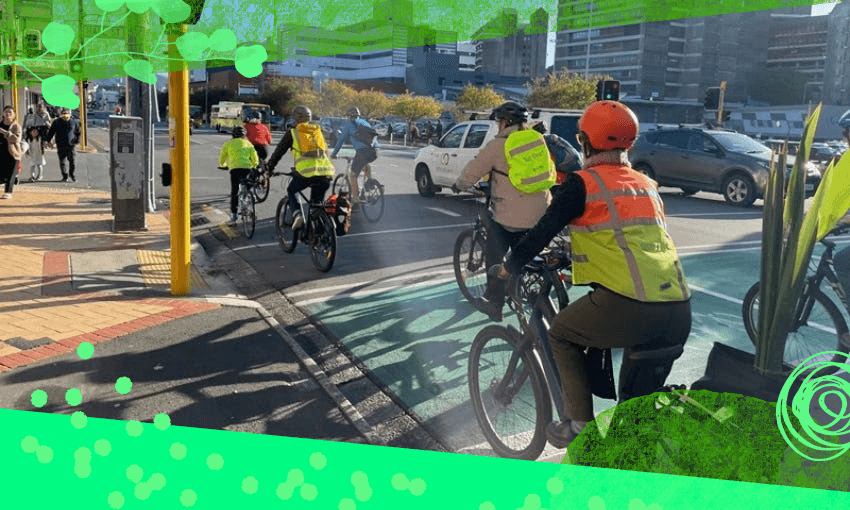‘Cycling Works’ aims to show business support for citywide cycle infrastructure.
This is an excerpt from our weekly environmental newsletter Future Proof. Sign up here.
Last week, supermarket giant Foodstuffs lost its attempt to block the construction of a cycle lane outside Thorndon New World in Wellington. The Spinoff’s Wellington editor Joel McManus has the details of a plucky grocer taking on Big Bicycle. The court case is the latest in an ongoing saga surrounding the capital’s Paneke Pōneke plans to expand its cycle network from 23km to 166km.
Far from catering to “ghost cyclists” – as one disgruntled business owner suggested – thousands of trips are registered every month on the new cycle infrastructure. It’s a number that is growing, with a 140% increase in bike trips since 2022, Stuff reports.
View this post on Instagram
Having safer cycle lanes means not having to practise “defensive cycling”, says Alex Dyer, co-chair of Cycle Wellington. “It lets me return to what is so enjoyable about riding a bike in the first place, which is just as close to flying as humans get,” he says.
Despite keeping people safe and providing more low-carbon transport options, cycle lanes tend to frazzle some who seem particularly wedded to the idea of reserving swathes of precious public space for storing private cars.
Which is understandable if you’re a street-level operation stressed out about competing with malls or retail parks with hundreds of car parks. But these concerns are unfounded. Cyclists and walkers have money to spend too.
“Evidence shows that lots of street-level businesses overseas actually thrive when they are in an environment that is friendly for people, not cars,” says Dyer. He’s right. The idea that replacing car parks with cycle lanes is bad for business is a frustratingly persistent myth, despite study after study finding either no overall impact, or a positive impact.
In Wellington, analysis of preliminary retail spend data for businesses adjacent to new cycle lanes finds that “data does not show a pattern of retail activity being negatively affected by changes to street layout”. Some businesses are even using the cycle lanes to innovate, like the Newtown Greengrocer which has introduced e-bike deliveries.
Despite naysayers often being lumped together under the amorphous label of “business”, plenty of businesses are supportive of cycling infrastructure. In Auckland, the Karangahape Road Business Association and Ponsonby Business Association supported projects that would create a cycle network.
Dyer and the folks at Cycle Wellington want to illustrate business support through their Cycling Works initiative. “It allows businesses to put their company’s brand behind calling for better cycling, so their people can get to work and back safely,” Dyer explains.
The idea originated in London, a city in the midst of a cycling renaissance, where advocates have collected 200 endorsements, including Deloitte, Microsoft and Coca-Cola. In Wellington, 19 businesses have signed up so far. Bike Auckland have just launched their version of Cycling Works too.
“Ultimately we’re after the network effect,” says Dyer. “Once you’ve got a way for people to get to a range of things they need – school, work, shopping – and it’s safe, you start seeing the numbers grow.”


